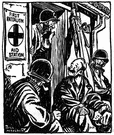World War I
Also found in: Thesaurus, Medical, Legal, Acronyms, Encyclopedia, Wikipedia.
Related to World War I: World War II
World War I
n. Abbr. WWI
A war fought from 1914 to 1918, in which Great Britain, France, Russia, Belgium, Italy, Japan, the United States, and other allies defeated Germany, Austria-Hungary, Turkey, and Bulgaria.
American Heritage® Dictionary of the English Language, Fifth Edition. Copyright © 2016 by Houghton Mifflin Harcourt Publishing Company. Published by Houghton Mifflin Harcourt Publishing Company. All rights reserved.
World War I
n
(Historical Terms) the war (1914–18), fought mainly in Europe and the Middle East, in which the Allies (principally France, Russia, Britain, Italy after 1915, and the US after 1917) defeated the Central Powers (principally Germany, Austria-Hungary, and Turkey). The war was precipitated by the assassination of Austria's crown prince (Archduke Franz Ferdinand) at Sarajevo on June 28, 1914 and swiftly developed its major front in E France, where millions died in static trench warfare. After the October Revolution (1917) the Bolsheviks ended Russian participation in the war (Dec 15, 1917). The exhausted Central Powers agreed to an armistice on Nov 11, 1918 and quickly succumbed to internal revolution, before being forced to sign the Treaty of Versailles (June 28, 1919) and other treaties. Also called: First World War or Great War
Collins English Dictionary – Complete and Unabridged, 12th Edition 2014 © HarperCollins Publishers 1991, 1994, 1998, 2000, 2003, 2006, 2007, 2009, 2011, 2014
World War I
n.
the war fought mainly in Europe and the Middle East, between the Central Powers and the Allies, beginning on July 28, 1914, and ending on Nov. 11, 1918, with the collapse of the Central Powers.
Random House Kernerman Webster's College Dictionary, © 2010 K Dictionaries Ltd. Copyright 2005, 1997, 1991 by Random House, Inc. All rights reserved.
ThesaurusAntonymsRelated WordsSynonymsLegend:
Switch to new thesaurus
| Noun | 1. |  World War I - a war between the allies (Russia, France, British Empire, Italy, United States, Japan, Rumania, Serbia, Belgium, Greece, Portugal, Montenegro) and the Central Powers (Germany, Austria-Hungary, Turkey, Bulgaria) from 1914 to 1918 World War I - a war between the allies (Russia, France, British Empire, Italy, United States, Japan, Rumania, Serbia, Belgium, Greece, Portugal, Montenegro) and the Central Powers (Germany, Austria-Hungary, Turkey, Bulgaria) from 1914 to 1918Battle of the Marne, Belleau Wood, Chateau-Thierry, Marne River - a World War I battle in northwestern France where the Allies defeated the Germans in 1918 battle of Caporetto, Caporetto - battle of World War I (1917); Italians were defeated by the Austrian and German forces Dardanelles campaign, Dardanelles - the unsuccessful campaign in World War I (1915) by the English and French to open a passage for aid to Russia; defeated by the Turks battle of Jutland, Jutland - an indecisive naval battle in World War I (1916); fought between the British and German fleets off the northwestern coast of Denmark Argonne, Argonne Forest, Meuse-Argonne, Meuse-Argonne operation, Meuse, Meuse River - an American operation in World War I (1918); American troops under Pershing drove back the German armies which were saved only by the armistice on November 11 battle of Soissons-Reims, battle of the Aisne, battle of the Chemin-des-Dames, Soissons - a battle in World War I (May 1918); the Germans tried to attack before the American numbers were too great to defeat; the tactical success of the Germans proved to be a strategic failure battle of Tannenberg, Tannenberg - a battle in World War I (1914); decisive German victory over the Russians battle of Verdun, Verdun - a battle in World War I (1916); in some of the bloodiest fighting in World War I the German offensive was stopped first battle of Ypres, Ypres, battle of Ypres - battle in World War I (1914); heavy but indecisive fighting as the Allies and the Germans both tried to break through the lines of the others second battle of Ypres, Ypres, battle of Ypres - battle in World War I (1915); Germans wanted to try chlorine (a toxic yellow gas) as a weapon and succeeded in taking considerable territory from the Allied salient battle of Ypres, third battle of Ypres, Ypres - battle in World War I (1917); an Allied offensive which eventually failed because tanks bogged down in the waterlogged soil of Flanders; Germans introduced mustard gas which interfered with the Allied artillery |
Based on WordNet 3.0, Farlex clipart collection. © 2003-2012 Princeton University, Farlex Inc.
Translations
Eerste Wêreldoorlog
první světová válka
ensimmäinen maailmansota
Première Guerre mondiale
első világháború
første verdenskrig
Primul Război Mondial
World War I
n → la prima guerra mondialeCollins Italian Dictionary 1st Edition © HarperCollins Publishers 1995